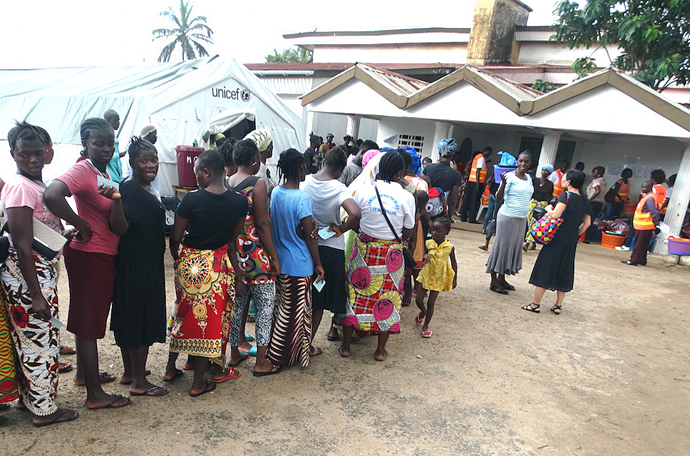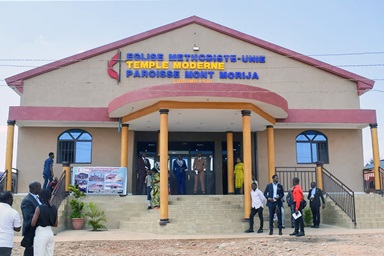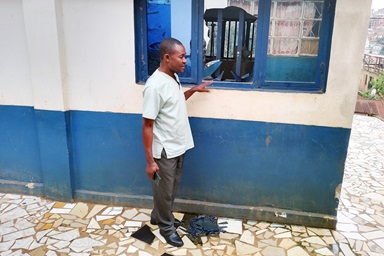Several months after deadly mudslides and floods, the United Methodist Sierra Leone Conference has continued to provide psychosocial support and trauma counseling to survivors of the Aug. 14 disasters.
But those services, in collaboration with the Council of Churches in Sierra Leone, will end Nov. 15 when the government will officially close the camps, the Office of National Security recently announced.
“The survivors are now more concerned about their life after the camps close down,” said the Rev. James Boye-Caulker, who has been leading a team of United Methodist pastors providing support. Boye-Caulker and other pastors still conduct an 8:30 a.m. devotion every day, sharing words of hope with the survivors.
The government issued a severance plan allowing residents to receive a total of Le5,046,000 (an equivalence of $662) in three monthly distributions. Households are expected to leave camp immediately after they receive the November severance package, which government refers to as the Early Recovery Exit Package.
A few of the camp residents at Juba Camp who spoke to United Methodist News Service on Nov. 2 expressed fears and reservations about their future as key issues leading to the severance had not been resolved.
Abdulai Massaaquoi, 25, a final-year student at Milton Margai College of Education and Technology who was displaced from Pentagon, said he had received the September and October packages but the November had not yet been paid and that they needed to receive all three before they could be sure of getting even a very moderate home.

In a photo from September, 2017, survivors of a deadly mudslide on Aug. 14 near Freetown, Sierra Leone, line up at Old School Camp to receive relief items from the Sierra Leone Annual Conference disaster response team. The team distributed good including items specifically for women and children, along with 200 bags of rice — Sierra Leone's staple food. Photo by Phileas Jusu, UMNS.
Housing is a huge problem in post-war, overpopulated Freetown. Even where there is ready cash, it is difficult to get a place to rent, especially for those at the bottom layer of the economy who do not earn enough money to afford good housing. In addition, most house owners ask for a minimum of two years’ rent from competing tenants.
Pastor Momoh Kallon, 34, of Mount Sugar Loaf, who was assistant pastor at Evangelical Church for all Nations, said his entire church and home were covered with the rubble from the mudslide. His wife, who is recovering in the hospital, suffered a leg injury when a boulder from the mudslide hit her.
Kallon is worried that he might not find a place to stay after Nov. 15. He, too, has received two payments of the severance package, but had not received the balance, which he hoped to use to go in search of a home to rent.
His only other option may be to stay with a friend while waiting for the money. “We have been expressing these concerns to the Office of National Security about the timeliness for receiving the money so that we can go in search of places. They had always promised to fast-track the process but time is catching up on us.”
John B. Conteh, 40, from Kamayama, has not received any money at all. His registration process has not been completed and he must get an ID card and a phone to qualify to receive the funds. The Aug. 14 rain swept away his entire compound and two people there died. He and others were lucky to escape because someone woke them up and they hurriedly waded through the fast-advancing flood.
Isatu Sesay, 29, also has not finished the registration process. “Every week, the authorities here tell us ‘next week we’d give you the cards and phone’ but nothing happens, and today is Nov. 2 and we don’t know what else to do. Everywhere we’ve been inquiring, landlords have been asking us for money, which we don’t have,” she said.
Jesica Deen, 24, said the news that new houses being constructed by government contractors in eastern Freetown were not specifically for mudslide survivors has sent shock waves among the displaced community.
“The money the government has promised to pay us is not enough to rent a home,” she explained. “A small apartment of two rooms and a parlor now costs a minimum of Le10,000,000 (an equivalence of $1,315). The government is giving us in total about Le5,000,000.
The Disaster Response Team of the Sierra Leone Annual Conference doled out over 200 bags of rice — Sierra Leone’s staple food — together with other condiments to mudslide and flood survivors worth about $30,000. The packages also include special items for women and children.
At the Old School camp, the Rev. Solomon Rogers, administrative assistant to the bishop, presented the relief goods on behalf of the bishop and The United Methodist Church and said it was the denomination’s effort to support the government of Sierra Leone to care for survivors and victims. A military officer who was in charge of logistics at the camp, Captain Michael Turay, thanked the team on behalf of the Office of National Security and prayed for all those whose concerted efforts made the donation possible,
Jusu is director of communications for The United Methodist Church in Sierra Leone.
News media contact: Vicki Brown at (615) 742 5470 or [email protected]
Like what you're reading? Support the ministry of UM News! Your support ensures the latest denominational news, dynamic stories and informative articles will continue to connect our global community. Make a tax-deductible donation at ResourceUMC.org/GiveUMCom.




